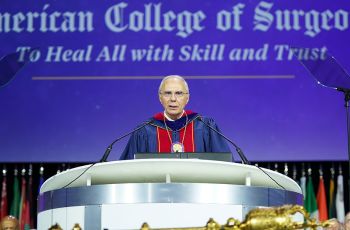According to the Alzheimer’s Association, Alzheimer’s disease accounts for 60-80% of dementia cases in the United States. June is Alzheimer’s and Brain Health Month, a time for increased awareness of the disease and conversation around treatment and prevention. The Memory Clinic at the George Washington University (GW) Medical Faculty Associates (MFA) works with patients who have Alzheimer’s and other dementias as well as adults with new cognitive and memory changes to develop care plans that support their individual goals and values.
Christina Prather, MD, director of the GW Memory Clinic and assistant professor of medicine at the GW School of Medicine and Health Sciences, discusses the signs of Alzheimer’s disease and the importance of early detection.
Q: What is Alzheimer’s disease?
Prather: Alzheimer’s disease is the most common type of dementia and causes irreversible loss of cognition, which includes your ability to remember, communicate, and make decisions, things that are essential to your autonomy.
Q: At what age do people typically start showing signs of having Alzheimer’s?
Prather: Early Alzheimer’s begins before the age of 60. When most people think about Alzheimer’s, they think about people who are starting to show signs of memory loss in their mid-60s. That’s technically late-onset Alzheimer’s.
Q: Is there a particular group most at-risk for Alzheimer’s disease?
Prather: For a long time, there was a misconception that Alzheimer’s was more common among white people. One of the biggest things we are seeing is that there have been barriers to access diagnosis and treatment for communities who are traditionally underrepresented. We know now that prevalence is equal, and often higher, in non-white communities. This is starting to gain more attention, which is important.
Q: Along with memory loss, are there other signs that people can be on the lookout for?
Prather: People can also have problems with feeling disoriented or getting lost, or having difficulty with financial management, such as handling money or missing some bills. Identifying early problems with financial management can be more complicated than it used to be due to automated bill pay, which can hide early signs of money mismanagement. Other signs include repeating questions or sharing the same information repeatedly. Some might have more difficulty completing daily tasks, and find routine tasks take longer to complete as the brain is undergoing changes in early Alzheimer’s disease.
Q: Are there any preventive measures people can take against Alzheimer’s?
Prather: What’s good for the heart is good for the brain! Things like eating a nutritious diet, taking care to control cardiovascular risk factors like high blood pressure, elevated cholesterol, and diabetes is critical for brain health. Exercising is important as is having purposeful engagement and continuing to use your brain. Unfortunately, there are not yet good medications that prevent, slow, or reverse early Alzheimer’s disease.
Q: What does treatment for Alzheimer’s disease look like?
Prather: Everyone should have a personalized treatment plan for Alzheimer’s that takes into account their individual goals, values, risk factors, cognition, overall brain health, and support system. It’s important to have an assessment for concerns about memory or thinking so you can be evaluated for reversible causes or interventions to slow the decline. Once someone is given a diagnosis of Alzheimer’s disease, medication options are limited. Instead, we focus on is working with individuals and their support systems to have a plan in place to help maintain autonomy and the best quality of life as long as possible.
Q: What step can caregivers and family members take for loved ones suffering with Alzheimer’s?
Prather: One of the most important things they can do is take care of themselves. Caregivers can’t give to others what they don’t have to give. It’s OK to ask for help and get help – it’s nearly impossible to do it all by themselves. The second most important thing is to help individuals who have Alzheimer’s maintain their independence and enjoyment in life by creating and seek ways to enhance autonomy and purposeful living as long as possible. In some cases, caregivers want to show their love by helping and doing things for their loved one. We encourage care partners to empower people with Alzheimer’s to continue to do tasks with support and find other ways to do things they want to enjoy and are still able to participate in, even if their participation looks different from what it used to.
Q: How does the GW Memory Clinic help patients with Alzheimer’s?
Prather: When someone comes to our clinic with concerns about cognition, we look for opportunities to improve or reverse cognition or prevent further decline in function. For people with emerging memory concerns or early-stage disease, we follow them regularly to continue to evaluate their concerns and ensure that if new issues arise, we have a relationship and can respond quickly. For patients who have established dementia diagnoses and are a little more advanced in their disease, we support them and their caregivers, taking care of the whole person, the treatment team, and the whole family unit, with a focus on maintaining quality of life, autonomy, and minimize the risk of other health care interventions. Our focus is on what matters most an ensuring health care interventions align with patient values.




